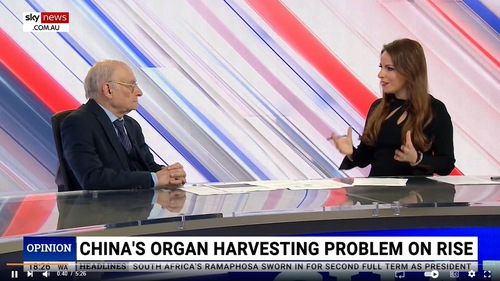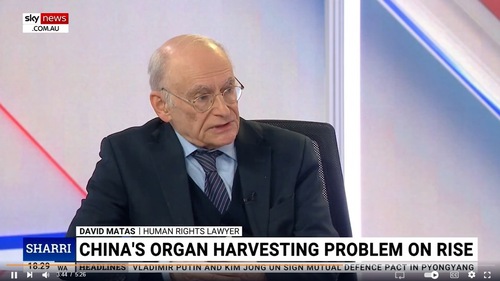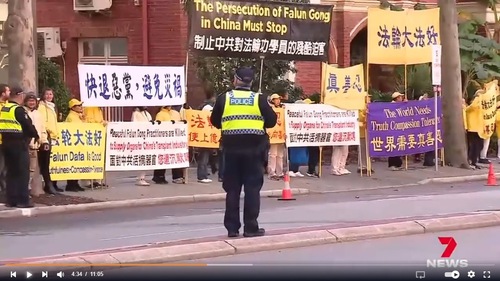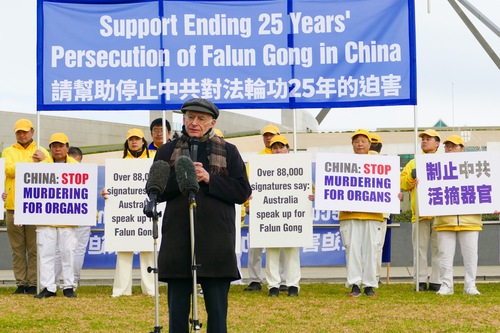(Minghui.org) Renowned human rights lawyer David Matas, member of the Order of Canada and author of Bloody Harvest: Organ Harvesting of Falun Gong Practitioners in China, was recently invited to visit Australia for nearly a month in June 2024. He met elected officials as well as local residents in Canberra, Melbourne, Adelaide, Perth, and Sydney, and was interviewed by numerous mainstream media outlets. The discussions focused on curbing forced organ harvesting of prisoners of conscience by the Chinese Communist Party (CCP) and preventing Australians from becoming accomplices to these egregious crimes.
Sky News Australia held a special interview with Mr. Matas and skynews.com.au published an article on his visit to expose the CCP’s brutal organ harvesting. Australia’s News Weekly published an article on June 19 titled, “China’s Coerced Organ Harvesting a ‘Stain on the World.’”
The Chinese premier was also visiting Australia during Mr. Matas’s stay. As a result, the human rights violation of Falun Gong practitioners in China and forced organ harvesting by the CCP were hot topics. Based on his in-depth investigation of organ harvesting over the past nearly 20 years, Mr. Matas provided updated information for elected officials and the Australian public so they can better understand the reality of this horrific crime.

Sky News: Grim Reality of Organ Harvesting
Well-known Australian journalist and news anchor Sharri Markson conducted an exclusive interview with Mr. Matas on Sky News on June 21. During the live broadcast, the anchor said China’s record of human rights abuses is appalling, but the issue failed to get much airtime during that week’s visit by the Chinese Premier.
“One growing problem is China’s organ harvesting practices. We don’t hear much about it, but there have been extensive reports that state-run hospitals have secretly harvested body parts from tens of thousands of prisoners, removing their vital organs sometimes while they’re alive,” Ms. Markson said. “It’s reportedly been common practice in China for nearly two decades.”
That same day, skynews.com.au published an article titled, “Grim reality behind the systematic organ harvesting of Chinese prisoners revealed by human rights lawyer.” The article stated, “Concerns over organ harvesting practices in China have surfaced repeatedly for almost two decades, with reports of political prisoners and members of the banned Falun Gong spiritual group having their organs removed against their will first emerging in 2006. A 2007 investigative report conducted by Canadian MP David Kilgour and human rights lawyer David Matas concluded that a hospital in the country’s Sujiatun District was conducting large-scale organ seizures from unwilling Falun Gong practitioners.”

During the interview, Matas revealed the severity of forced organ harvesting in China and why the CCP commits this crime. This malpractice is profitable and it can also suppress political opponents, he explained. Although the CCP declared that it ended the practice of organ extraction from death row prisoners, forced organ harvesting still continues in China.
The scale of this crime is alarming. It is widespread in China and has been going on since the early 2000s. “The victims are primarily prisoners of conscience, practitioners of Falun Gong, Uyghurs, Tibetans, and House Christians,” explained Matas. The biggest demand for organs is kidneys, and it is known that one can survive with just one kidney. “But in fact, nobody survives these organ extractions because they extract several organs at once and people are killed through organ extraction,” he added.
During the interview, the anchor explained that these are brutal operations. Since China is known to be unfriendly to journalists, she was curious about how Mr. Matas conducted the investigation. He described the time-consuming approach. “For instance, for transplant volumes, what we did is we went to the individual hospitals and added up what they posted on their websites. And we went to about 700 hospitals. So as you can imagine, it took a lot of time to do that,” he explained. “But it’s conceptually not very difficult. We interviewed people who got out of a prison and out of China. And they told us the Falun Gong practitioners were blood tested, organ examined, and the others were not.” From these 700-plus hospitals, considerable evidence was obtained on forced organ harvesting.
Mr. Matas indicated that more work needs to be done. “There were 12 UN human rights rapporteurs in June 2021 who issued a joint statement, saying there’s credible evidence of organ harvesting with prisoner of conscience victims, Falun Gong victims expressed serious concern, asked China to cooperate with an independent investigation and asked China to respond, which they did with nonsense. So it’s not as if they’ve been completely silent, but it’s certainly incommensurate with the nature of the problem.”

News Weekly: “Stain on the World”
Australian magazine News Weekly published an article on June 19 written by Patrick J. Byrne, immediate past National President of the National Civic Council (NCC). Citing David Matas’ work, the article said China’s industrialised mass killing of prisoners of conscience to harvest their organs for profit is “a spreading stain on the world.”
According to Matas’ investigations, China’s organ harvesting expanded after Falun Gong practitioners began silently protesting at Tiananmen Square in 1999. “As these practitioners do not smoke or drink alcohol, they provided clean organs for transplant compared with others in Chinese prisons, where hepatitis is rife,” he explained.
As the availability of Falun Gong prisoners declined, new groups have been targeted for organ harvesting – Tibetans, Uyghurs and other Xinjiang/East Turkestan minorities, and House Christians, he added.
“Based on the advertised price of organs, this industry, heavily managed by the Chinese military, is estimated to earn about $US8.9 billion annually, mostly from foreigners coming from South Korea, Japan, Saudi Arabia, the UAE and Egypt,” the article stated. Matas’ team has amassed a vast database of evidence on the industry, although gathering this evidence was not easy.
The article continued, “The mass killing of prisoners of conscience for their organs does not have the same visibility as many other wrongs. The victims cannot speak. Their bodies, cremated, cannot be autopsied.” According to Matas, “The crimes occur in settings – detention centres and hospitals – where there are no bystanders, only perpetrators and victims. The few whistleblowers mostly do not want to make public statements both because of the risk to themselves and their families and the wish to avoid admitting publicly their own guilt. Chinese hospital, prison and detention records are not publicly available.”
The CCP engages in systematic cover-up, closing down data streams once cited, and denying all evidence of the abuse, even evidence which comes from their own records, Matas explained. They fabricate contrary evidence, which is easy enough to see through with diligence, but can be deceptive for the unwary, he added.
Matas’s team interviewed people who have been to China for transplants. They said that appointments can be made for transplants of vital organs – liver, lung and heart – at fixed times or on days’ or weeks’ notice. But in other places in the world, waiting times are months and years. That means that “someone is being killed for that transplant,” he said.

“China is the largest transplant country in the world. Yet, until 2010, it had no deceased organ donation system. That system produces only a tiny number of donations even today. So, what can be done to counter this 20th-century horror?” the article reported. A 2015 Council of Europe Convention against Trafficking in Human Organs mandates state parties to prohibit complicity by nationals or permanent residents in transplant abuse abroad. Fifteen states have so far ratified the Convention.
“Separately, Israel, Taiwan, Italy, South Korea, Britain and Canada have legislated against extraterritorial complicity in organ-transplant abuse. The U.S. Congress has prepared a bill [Editor’s note: the Falun Gong Protection Act] requiring revocation of passports of those complicit in forced organ harvesting, reports on that complicity, and sanctions on the complicit,” stated the report.
In addressing transplant tourism, Matas said that there should be mandatory reporting by health practitioners to health administrators of organ transplants, just as there is for reporting incompetence and sexual abuse, child abuse, incapacity, communicable diseases, and so on. Health practitioners are able to identify organ-transplant tourists because they require ongoing anti-rejection drugs.
Citing Matas, the report concluded, “While there is a wealth of human-rights violations around the world, it is hard to match China’s mass killing of innocents, of prisoners of conscience, for their organs.”
News Weekly is published by the National Civic Council (NCC), a grassroots organisation in Australia with over 80 years of history that aims to restore traditional values.
Copyright © 2024 Minghui.org. All rights reserved.
